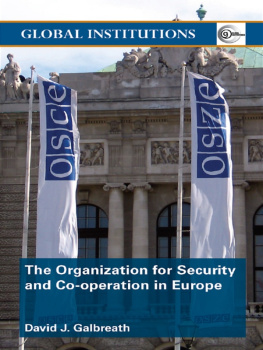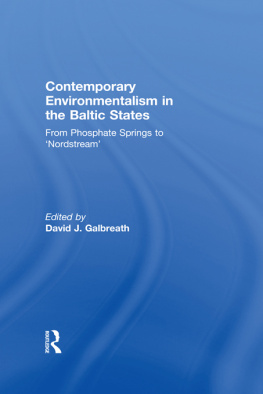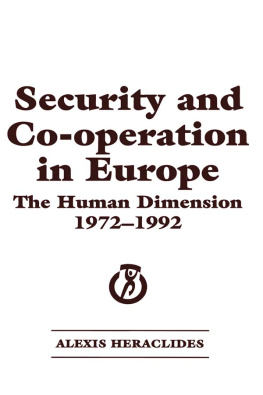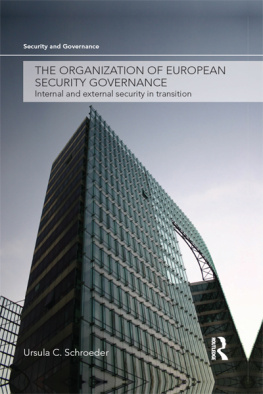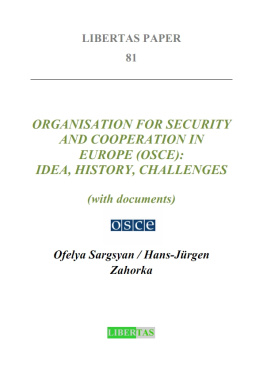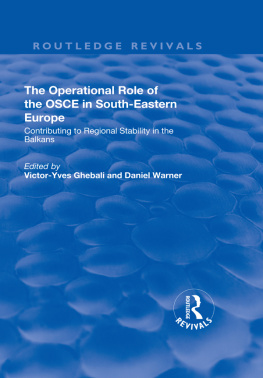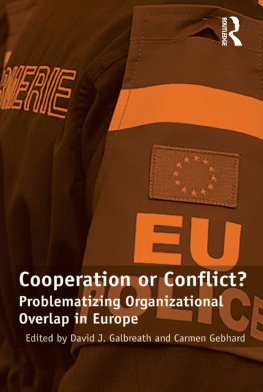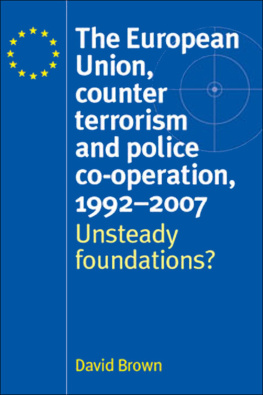David J. Galbreath - The Organization for Security and Co-Operation in Europe (Osce)
Here you can read online David J. Galbreath - The Organization for Security and Co-Operation in Europe (Osce) full text of the book (entire story) in english for free. Download pdf and epub, get meaning, cover and reviews about this ebook. year: 2007, publisher: Routledge, genre: Politics. Description of the work, (preface) as well as reviews are available. Best literature library LitArk.com created for fans of good reading and offers a wide selection of genres:
Romance novel
Science fiction
Adventure
Detective
Science
History
Home and family
Prose
Art
Politics
Computer
Non-fiction
Religion
Business
Children
Humor
Choose a favorite category and find really read worthwhile books. Enjoy immersion in the world of imagination, feel the emotions of the characters or learn something new for yourself, make an fascinating discovery.
- Book:The Organization for Security and Co-Operation in Europe (Osce)
- Author:
- Publisher:Routledge
- Genre:
- Year:2007
- Rating:4 / 5
- Favourites:Add to favourites
- Your mark:
- 80
- 1
- 2
- 3
- 4
- 5
The Organization for Security and Co-Operation in Europe (Osce): summary, description and annotation
We offer to read an annotation, description, summary or preface (depends on what the author of the book "The Organization for Security and Co-Operation in Europe (Osce)" wrote himself). If you haven't found the necessary information about the book — write in the comments, we will try to find it.
The Organization for Security and Co-Operation in Europe (Osce) — read online for free the complete book (whole text) full work
Below is the text of the book, divided by pages. System saving the place of the last page read, allows you to conveniently read the book "The Organization for Security and Co-Operation in Europe (Osce)" online for free, without having to search again every time where you left off. Put a bookmark, and you can go to the page where you finished reading at any time.
Font size:
Interval:
Bookmark:
The CUNY Graduate Center, New York, USA
and Rorden Wilkinson
University of Manchester, UK
A guide for a new era
by Julie Mertus (American University)
by Leon Gordenker (Princeton University)
by Michael G. Schechter (Michigan State University)
Practice and promise
by Edward C. Luck (Columbia University)
Resurgence and the development agenda
by Chris May (University of Lancaster)
The enduring alliance
by Julian Lindley-French (European Union Centre for Security Studies)
Politics of conditional lending
by James Raymond Vreeland (Yale University)
by Hugo Dobson (University of Sheffield)
A multi-stakeholder approach to global governance
by Geoffrey Allen Pigman (Bennington College)
A neutral humanitarian actor
by David Forsythe (University of Nebraska) and Barbara Ann. Rieffer-Flanagan (Central Washington University)
by David J. Galbreath (University of Aberdeen)
by Steve Hughes (University of Newcastle)
by Timothy Shaw (Royal Roads University)
The politics and practice of refugee protection into the twenty-first century
by Gil Loescher (University of Oxford), James Milner (University of Oxford), and Alexander Betts (University of Oxford)
Setting standards
by Craig Murphy (Wellesley College) and JoAnne Yates (Massachusetts Institute of Technology)
by M.J. Peterson (University of Massachusetts, Amherst)
Conceptualization and its consequences
by Thomas G. Weiss (The CUNY Graduate Center) and David A. Korn
by Elizabeth R. DeSombre (Wellesley College)
by Ian Taylor (University of St. Andrews) and Karen Smith (University of Stellenbosch)
Multilateralism and international security
by Edward Newman (United Nations University)
by Bernard Hoekman (World Bank) and Petros Mavroidis (Columbia University)
Challenges of globalization, security and governance
by Samuel M. Makinda (Murdoch University) and Wafula Okumu (McMaster University)
From reconstruction to development to equity
by Katherine Marshall (Georgetown University)
by Richard Woodward (University of Hull)
by Peter Willetts (City University, London)
An analysis
by Jacqueline Anne Braveboy-Wagner (City College of New York)
by Jean-Loup Chappelet (IDHEAP Swiss Graduate School of Public Administration) and Brenda Kbler-Mabbott
by Clive Archer (Manchester Metropolitan University)
by Kelley Lee (London School of Hygiene and Tropical Medicine)
The new frontier of global institutions
by John Mathiason (Syracuse University)
by Peter Walker (Tufts University)
by Bertrand G. Ramcharan (Geneva Graduate Institute of International Studies)
Taylor & Francis
2 Park Square, Milton Park, Abingdon
Oxfordshire OX14 4RN, UK
+44 (0)207 842 2302 Fax
www.routledge.com
by Routledge
2 Park Square, Milton Park, Abingdon, Oxon OX14 4RN
Font size:
Interval:
Bookmark:
Similar books «The Organization for Security and Co-Operation in Europe (Osce)»
Look at similar books to The Organization for Security and Co-Operation in Europe (Osce). We have selected literature similar in name and meaning in the hope of providing readers with more options to find new, interesting, not yet read works.
Discussion, reviews of the book The Organization for Security and Co-Operation in Europe (Osce) and just readers' own opinions. Leave your comments, write what you think about the work, its meaning or the main characters. Specify what exactly you liked and what you didn't like, and why you think so.

